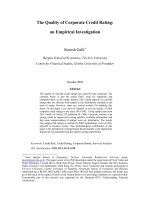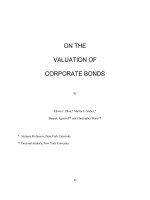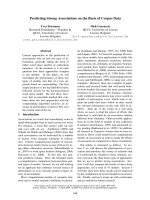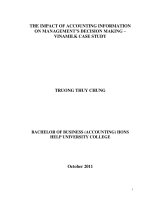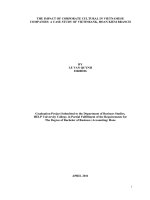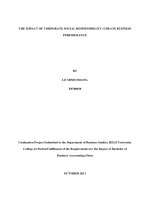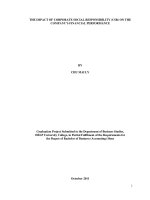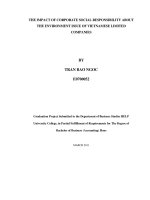VINAMILK Case Study The Cream Of Corp
Bạn đang xem bản rút gọn của tài liệu. Xem và tải ngay bản đầy đủ của tài liệu tại đây (64.57 KB, 3 trang )
Vinamilk is probably Vietnam’s most familiar consumer brand, and it is widely considered to be
the country’s best-run firm. Over a decade its profits have grown by close to one-third each year.
Hence the interest among foreigners in a 9% share to be sold by the government this year—the
first tranche in a disposal which should eventually see Vietnam’s communist government give up
its entire 45% stake in the firm. It is one of several big companies which the ruling party now
promises to part with; two others are the Hanoi and Saigon beer companies, known as Habeco
and Sabeco. After years of divesting mainly small slivers of unappealing enterprises, Vietnam is
at last offering foreigners a slice of its best assets.
Vinamilk meets much of Vietnam’s daily demand for dairy products, including four-fifths of its
condensed milk (most often found lurking sweetly at the bottom of the country’s famous
coffees). Last year it earned pre-tax profits of around $420m on revenues of $1.8 billion, and has
plenty of further room to grow. Vietnam’s economy is expanding at more than 6% annually. For
now, its 93m people drink far less milk than their neighbors.
Foreign investors already own about half of the firm (an unusually high share), which has a
market valuation of more than $9 billion. They praise the steady hand of Mai Kieu Lien, its boss
for 23 years, who has kept Vinamilk closely focused on its core business while many other large
Vietnamese companies have sprawled. It now wants to invest in more foreign ventures, beyond
its present outposts in America, Poland, Cambodia and New Zealand. But it also aims to get
rawer milk from within Vietnam itself, where dairy farming remains a fairly small business.
One keen bidder may be ThaiBev, a food-and-drink conglomerate attracted in part by Vinamilk’s
enormous distribution network. It already owns 11% of the dairy firm through a subsidiary,
Fraser and Neave, and has cash to spend. Thai companies are piling into Vietnam, driven both by
their neighbour’s zingy consumer markets and by fears of stagnation at home. In December
Singha, another Thai brewer, said it was pumping more than $1 billion into Masan Group, a
conglomerate with operations in food, mining and banking.
ThaiBev is also thought to be among a half-dozen brewers eyeing the government’s stakes in
Sabeco and Habeco, which bureaucrats talk of selling by the end of next year. Vietnam’s boozers
drink almost solely beer. A big swig of it is still home-brewed and served in salty roadside pubs.
The industry says production among corporate brewers has been growing by about 7% annually
and could jump another quarter by 2020. Sabeco and Habeco hold around three-fifths of the local
beer market; the sale of the government’s 90% and 82% stakes, respectively, in the two firms
should raise more than $2 billion.
The government’s pledges are a relief to investors who worried that after the Communist Party’s
five-yearly congress back in January, a conservative faction had gained in influence. The new
leadership has tightened its grip on civil society, but appears ready to tackle vested interests
which have previously held up sales of state-owned firms. It needs cash to fund new
infrastructure and to rein in the national debt, which is nearing its legal limit of 65%.
Hiccups are inevitable. Many consumers worry that the impending sales to foreigners will kill off
well-loved local brands (though that seems unlikely). There is some ominous talk of creating
“golden shares” which could help the party’s bigwigs retain influence over firms even when their
stakes are depleted. The schedules will doubtless slip. But in contrast to previous sales, the
government has made its plans for the country’s leading companies surprisingly explicit and its
timetables unusually clear.
a) Discuss the benefit that Vinamilk may stand to gain if ThaiBey a large congmerate
were to invest in it.
Investment of a ThaiBey market can provide new technologies, capital, products,
organizational technologies, management skills and potential cooperation and business
opportunities for Vinamilk.
b) What possible challenges do you anticipate from this alliance. If the ThaiBey equity
increases to an eventual 45% stake?
Incompability of partner, access to information, distribution of earning, Loss of autocomy
and changing circumstances
c) As a pioneering company taking advantage of vietnamese gorvernments policy to
allow foreign acquire up to 45% stake in state own enterprise like Vinamilk, what
first mover advantage do you anticipate that ThaiBey may stand to gain.
When pioneering help will built a firm’s reputation and creates strong brand loyalty.
When a first mover’s customer will thereafter face significant switching costs. When
property rights protection thwart rapid imitation of the initial move. When an early lead
enables movement down the learning curve of rivals. When a first mover can set the
technical standard for the industry.

